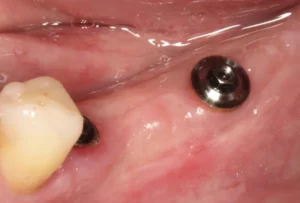Dental implant problems can range from minor issues to complex complications, impacting oral health and overall well-being. Common challenges include infection, improper integration with bone, and damage to surrounding nerves or tissues. To prevent such problems, it is crucial to maintain excellent oral hygiene, attend regular dental check-ups, and select a skilled dental implant specialist. Early detection and intervention can significantly reduce the risk of severe complications, ensuring the longevity and success of dental implants.
Common Dental Implant Problems
Dental implants offer a state-of-the-art solution for replacing missing teeth, but like all medical procedures, they are not without their risks and potential complications. Understanding these issues can help both patients and practitioners take preventative measures to ensure the best outcomes. Below, we will discuss some of the most common problems associated with dental implants.
Addressing potential complications early can significantly improve the success rate of dental implants. From infection at the implant site to nerve damage, being aware of these issues can make all the difference in treatment and recovery. Let’s delve deeper into these common problems.
Infection at the Implant Site
One of the most common complications following a dental implant procedure is an infection at the implant site. This can occur soon after the surgery or even months later. An infection can compromise the implant and surrounding bone and tissue, making it crucial to identify and treat early.
Common signs of an infection include persistent pain, swelling, redness, and a discharge that might appear around the implant. In severe cases, an infection can cause fever and chills, indicating that the infection has spread beyond the local site.
- Antibiotics: Often the first line of defense against infection.
- Proper oral hygiene: Critical in preventing infections.
- Regular check-ups: Allow for early detection and prompt treatment.
A study published in the “Journal of Clinical Periodontology” found that strict adherence to post-operative care instructions significantly reduces the risk of infection, highlighting the importance of patient compliance.
Implant Failure due to Bone Loss
Bone loss around the dental implant can lead to its failure, a problem more common than many might think. The underlying cause is often inadequate bone density and volume at the implant site, which can prevent the implant from properly integrating with the bone.
Regular dental check-ups and imaging can help monitor the health of the bone around the implant. If bone loss is detected early, interventions such as bone grafting or other regenerative procedures can be employed to salvage the implant.
Research indicates that patients with pre-existing conditions like osteoporosis are at a higher risk of implant failure due to bone loss. Therefore, a thorough assessment and planning phase are fundamental prior to the procedure.
- Bone grafting: A procedure to add bone to the implant site.
- Platelet-rich plasma (PRP): Used to promote bone growth and healing.
- Regular monitoring: Essential to catch issues early.
Patients should also be advised to avoid smoking and excessive alcohol consumption, as both can contribute to poor bone health and increase the risk of implant failure.
Nerve Damage
Nerve damage is a less common but severe complication that can occur during or after a dental implant procedure. This can result in symptoms like numbness, tingling, or even chronic pain in the lips, tongue, or gums.
Careful planning and precision during the surgical procedure are critical to avoiding nerve damage. Pre-operative imaging such as CBCT scans can help map out the location of nerves, allowing the dental surgeon to plan the implant placement carefully.
If nerve damage occurs, immediate intervention is essential. In some cases, symptoms may be temporary and improve over time, but irreversible damage can also occur, which might necessitate removal of the implant.
- Pre-operative imaging: Key in avoiding nerve pathways.
- Minimally invasive techniques: Reduce the risk of nerve damage.
- Prompt treatment: Critical if nerve damage is suspected.
A study in the “International Journal of Oral & Maxillofacial Surgery” highlighted that nerve damage occurred in less than 1% of cases, emphasizing the importance of advanced imaging techniques in modern implantology.
Understanding these common issues can significantly enhance the success rate of dental implants. By staying informed and vigilant, both patients and practitioners can take steps to mitigate these risks. For more in-depth information on related topics, make sure to explore our other articles.
Warning Signs of Dental Implant Problems
Dental implants have revolutionized modern dentistry by providing a durable and aesthetically pleasing solution for missing teeth. However, like any medical procedure, they are not without potential complications. It is crucial to be aware of the warning signs that might indicate problems with your dental implants. Early detection and intervention can make a significant difference in addressing any issues before they become severe.
Patients must be vigilant about monitoring the condition of their dental implants. Recognizing the symptoms of potential problems can prevent further complications and ensure the longevity of the implant. In this article, we will discuss some of the most common warning signs, including persistent pain or discomfort, swelling, and loosening of the implant.
Regular check-ups with your dentist are essential for maintaining oral health and ensuring that your dental implants remain in optimal condition. If you notice any of the warning signs discussed below, it is highly recommended to seek professional advice immediately.
Persistent Pain or Discomfort
Experiencing pain immediately after getting a dental implant is normal as it is part of the healing process. However, if the pain or discomfort persists beyond a reasonable time frame or becomes increasingly severe, it could be a sign of a more serious issue. Here are some potential causes of persistent pain:
- Infection: An infection at the implant site can cause severe pain and discomfort. Bacterial infections are particularly insidious because they can infiltrate the bone and surrounding tissues, making them harder to treat.
- Implant Rejection: While rare, the body can reject a dental implant in a process similar to organ transplant rejection, leading to prolonged pain.
- Nerve Damage: During the insertion process, if the implant is placed too close to a nerve, it may cause continuous pain or a tingling sensation.
Ignoring persistent pain can result in more severe complications such as bone loss or systemic infections. It is crucial to communicate any discomfort to your dentist immediately. They may need to perform diagnostic tests like X-rays to identify the underlying cause and prescribe appropriate treatment, such as antibiotics for infection or adjustments to the implant.
Understanding the warning signs of dental implant problems can help you maintain the health and functionality of your implants for years to come. Regular dental check-ups and immediate attention to any unusual symptoms are your best defense against potential complications. Don’t hesitate to read more of our articles to stay informed about dental health and the latest advancements in implantology.
Preventing Dental Implant Problems
Dental implants are a popular and highly effective solution for replacing missing teeth. However, like any surgical procedure, they come with their own set of potential challenges and complications. Understanding how to prevent these problems is crucial for ensuring the long-term success of your dental implants. By taking proactive measures, you can minimize the risks and enjoy a healthy, long-lasting smile. This article will delve into essential strategies such as choosing a qualified professional, maintaining good oral hygiene, and attending regular dental check-ups to keep your dental implants in optimal condition.
Choosing a Qualified Professional
The first step in preventing dental implant problems is to choose a qualified and experienced professional. Not all dentists have the specialized training required to perform implant procedures. Look for a dentist who has credentials in implantology and a proven track record of successful implant placements.
When selecting a dentist, consider their educational background, certifications, and ongoing training in implant dentistry. You may also want to ask for referrals or read patient reviews to gauge their reputation and patient satisfaction levels.
Additionally, take advantage of consultations to discuss your specific needs and concerns. A qualified dentist will conduct a thorough evaluation, including imaging studies such as X-rays or CT scans, to plan the implant procedure meticulously.
Maintaining Good Oral Hygiene
Maintaining excellent oral hygiene is essential for the longevity of your dental implants. Plaque and bacteria can accumulate around the implant site, leading to inflammation and infection, known as peri-implantitis. To prevent this, brush your teeth at least twice a day using a soft-bristled toothbrush and fluoride toothpaste.
Flossing is equally important, as it helps to remove debris and plaque from areas that your toothbrush might miss. Consider using interdental brushes or water flossers to clean around the implant posts effectively. Your dental hygienist can recommend the best tools and techniques for your specific needs.
Avoiding habits such as smoking and excessive alcohol consumption can also play a significant role in maintaining oral health. Both of these habits can impair healing and increase the risk of complications.
Regular Dental Check-Ups
Regular dental check-ups are vital for early detection and prevention of potential implant issues. Your dentist will monitor the health of your implants and the surrounding tissues during these visits. They will also perform professional cleanings to remove plaque and tartar that regular brushing and flossing might miss.
These check-ups allow your dentist to catch any early signs of peri-implantitis or other complications. Early intervention can prevent minor issues from developing into more serious problems that could jeopardize the implant. During your check-ups, don’t hesitate to discuss any concerns or symptoms you may be experiencing. Promptly addressing issues such as pain, swelling, or changes in the feel of your implant can make a significant difference in outcomes.
Preventing dental implant problems requires a combination of choosing the right professional, maintaining good oral hygiene, and adhering to regular dental visits. By following these guidelines, you can ensure the long-term success and health of your implants. For more insights on dental health and implant care, explore our other articles.
Common Issues with Dental Implants
Dental implants are a popular and effective solution for replacing missing teeth, but like any medical procedure, they can come with their own set of complications. Knowing the potential issues and how to address them can help ensure the longevity and success of your dental implants.
What are the most common problems associated with dental implants?
The most prevalent issues with dental implants include infection around the implant site, known as peri-implantitis, failure of the implant to osseointegrate (properly integrate with the jawbone), and mechanical problems such as loose implants or broken prosthetic components. Other less common complications can include nerve damage or sinus problems, depending on the implant location.
How can I prevent complications with my dental implants?
Preventing complications begins with choosing an experienced dental implantologist for your procedure. Maintaining excellent oral hygiene is also crucial, which includes regular brushing, flossing, and using an antibacterial mouthwash. Attending all scheduled follow-up appointments with your dentist enables early detection and management of any potential issues. Discussing your medical history and any medications you take with your dentist can also help prevent complications related to dental implants.

My name is Salman Kapa, a 73-year-old expert in bone regeneration and dental implantology. With decades of experience in the field, I am dedicated to advancing our understanding of oral health and hygiene. Through my research and writing, I aim to contribute to the development of innovative solutions in dental care.




